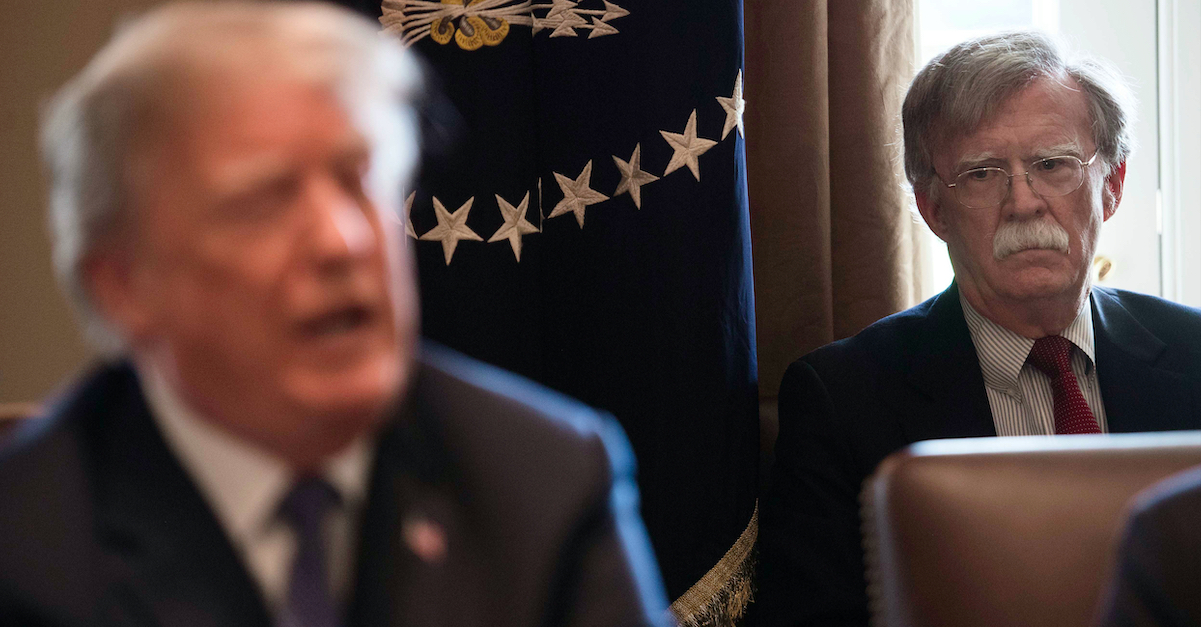
Andrew Weissmann, onetime key deputy to former special counsel Robert Mueller, may have some insight into what’s happening behind the scenes at Trumpworld as the Senate braces for potential witness testimony from former National Security Adviser John Bolton.
White House employees have been privately lobbying Republican Senators that any call for new witnesses—up to and including Bolton–would result in a “nasty court battle” that could potentially last for months on end–an interminable amount of time relative to the fact of 2020 being a general election year.
But in a late Tuesday article for centrist legal blog Just Security, Weissmann and New York University Law Professor Ryan Goodman say the White House is simply playing a game of confidence with the jurors in the president’s impeachment trial.
The basis for such speculation? The president was impeached late last year because the Democratic majority in the House found he committed crimes against the U.S. Constitution. But there may be even more potential culpability waiting in the wings.
President Donald Trump–by way of his underlings and apparatchiks–is threatening to invoke executive privilege to keep Bolton’s mouth shut.
House Democrats seem to be hanging their hat on one of two options: (1) Chief Justice John Roberts quickly dispatching the claim in the name of the Senate’s trial and responsibility; and/or (2) another federal judge declining to even countenance Trump’s executive privilege claim. Meanwhile, justice-curious members of the GOP like Sen. Lisa Murkowski (R-Alaska) may or may not be reticent to vote in favor of witnesses because of those aforementioned time constraints.
But according to Goodman and Weissman, all of the Republican hand-wringing and Democratic lip-licking may be for naught.
“[B]oth sides ignore a reason that the White House might never truly want to litigate the executive privilege question,” the duo argues. “That’s because it could cause a federal court (or the Chief Justice) in short order to make the determination that the president committed a crime.”
Recall: a recent analysis by the decidedly impartial Government Accountability Office (GAO) determined that the Trump administration committed a crime by withholding federally-earmarked funds for the Ukrainian military as part of Trump’s alleged Biden investigation scheme.
Goodman and Weissmann make their case:
As a threshold question, [whichever potential] judge will most probably look to whether an exception to executive privilege applies. The court could find that the privilege does not apply, for example, in those instances where the privilege has been waived by the President or his agents having spoken about the contents of the conversation. But there is another threshold issue: if the proposed testimony involves evidence of criminal activity (more commonly understood as the “crime-fraud” exception in the context of attorney-client privilege). As former State Department Legal Adviser Harold Koh and his coauthors explained in a thorough analysis of executive privilege and its exceptions, “government officials cannot use constitutional privileges to hide evidence of crimes.”
Therefore the exception in question would not only frustrate any executive privilege claim coming from the White House–it could easily be used to make a fairly solid case that Trump violated a federal statute. This would be a marked departure from the Democratic Party’s case against the 45th president so far.
At this point, Trump stands accused and charged with simply violating the Constitution–a charge that’s regularly leveled, probably accurately, against most U.S. presidents, but seldom enforced. His defense has consistently argued that the impeachment process has been an entirely political exercise lacking any real crimes. A statutory violation would make Trump a more common sort of criminal–not just the constitutional kind.
“Given the list of federal crimes that leading legal experts conclude applies to the alleged scheme with Ukraine, a federal court finding could be a significant blow to the White House both in the impeachment itself and more generally as it would not be coming from members of the other party,” the authors note. “It would also strengthen the hand of prosecutors who may be investigating others, like Mayor Rudolph Giuliani, as co-conspirators in such a scheme.”
[image via NICHOLAS KAMM/AFP Getty Images]